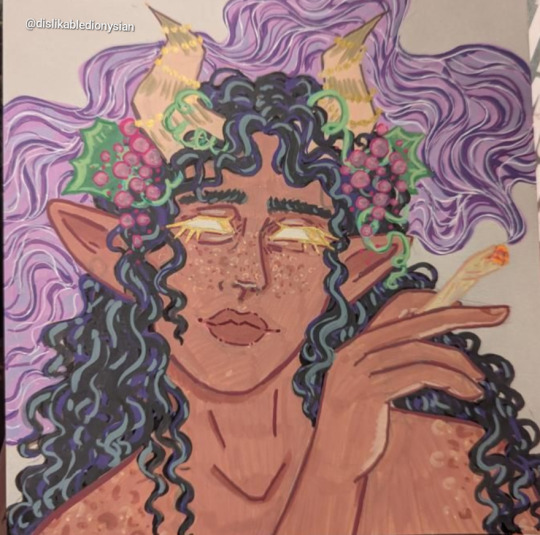Text
Hand Crafting Ideas for Offerings/Devotional Acts
I wanted to make a list of ideas for those who don't feel like drawing or painting, but still wanted to create on behalf of their Gods!
•Make fake flowers for them out of paper/tissue paper
•Cross stitch/Embroider them something they're associated with. Im embroidering a teapot for Hestia!
•Needle felt their sacred animal
•Devotional Jewlery Making (necklaces, bracelets, earings, prayer beads, ect.)
•Sculpt clay figures of your Gods/animals
•Make a polymer clay keychain/coin that reminds you of them so you can have them with you everywhere you go
•Making little trinkets/offering plates/dishes out of resin
•Wood carve their sacred animal
•Woodburn an offering plate or a pendulum board. You could also woodburn a box to keep their offerings in
•Make candles/wax melts for your Gods with scents curated to them!
•Make incense cones! They're surprisingly easy!
•Make bath bombs to take a devotional bath
•Make a specific soap to wash before prayer
•Make a diorama for their altar. I use foam/cardboard/and plastic trash for dioramas!
•Crochet/Knit an altar cloth! For more advanced, make a stuffed animal, veil, or devotional clothing
•Printing pictures/find magazines and make a physical collage of your God/their symbols/things you associate with them
•Build a mini temple for you Gods out of popsicle sticks or legos
•Take pictures of things you associate with, whether it be part of nature, animals, cozy places in your home, bodies of water, sunsets, ect.
•Start a little scrapbook of your deities
I was super inspired to make this because of the ask @khaire-traveler received the other day where they suggested origami for Apollo!
20 notes
·
View notes
Note
Hi!! Im thinking about adding Athena to my practice but I'm a bit lost on where to start and exactly what I can offer/do for her. Any advice?? Tysm in advice
Okay so, I talk about universal offerings in my post about food offerings that’s in my pinned, which is a good starting point.
Offerings do not need to be personalised but I do understand the want to make them that way, as it can feel like you’re closer to the deity. But it’s not a requirement.
That said, here is a list of offerings to Athena and things she’s associated with, and here is a list of subtle worship to her. You can also offer jewellery and clothes. I am working on a post about non academia-related offerings and devotional acts to Athena but I’m super busy at the moment so it’ll take a while.
For where to start more generally, I’d recommend reading her theoi.com page, noting down any epithets that resonate with you, reading the Homeric hymns, and checking out some of her myths. Looking at her domains can help you with coming up with devotional acts as they can be literally anything that falls under a domain.
For Athena, I also think it could be really useful to read The Iliad and The Odyssey because she plays quite a major role in both. I usually only say that for heroes but I think it’s applicable to Her. If you can afford to buy them, the Robert Fagles translation is probably best, but the Iliad I read for my classics course was E.V Rieu and it’s very easy to understand. If you can’t afford to buy them, they can be read on Perseus Library.
23 notes
·
View notes
Text
A drawn stick figure of Apollo is better devotional work than AI generated "artwork" of Apollo.
68 notes
·
View notes
Text

Four of Swords. Art by Jesse Lonergan, from The Unveiled Tarot.
28K notes
·
View notes
Text

Fuck it, Dionysus smoking a blunt
108 notes
·
View notes
Text
Subtle worship for Hestia
-Dedicate your favorite cup to her
-Make yourself a hot drink
-Make your bed
-Clean your room
-Learn to knit or crochet
-Bake
-Do a protection spell or cleanse
-Give your pets a cuddle
-Tell your friends and family you love them
-Do an act of kindness
-Make a recipe book
-Take care of yourself
-Listen to fire sounds on YouTube
-Meditate
-Raise awareness or donate to homeless
-Show Hospitality
-Spend quiet quality time at home (Even by yourself is fine)
-Spend time with the children and older people in your life
-Light a candle (even a fake one)
-Say goodnight and good morning to her
-Cuddle with a stuffed animal
-Get little things (Pillows, blankets, trinkets,) that make your room inviting
-Watch movies that make your feel cozy
-Wear colors that remind you of her
-Make your room your safe space
-Eat some bread, popcorn, fruit, other foods that remind you of her in her name
-Be someone people can go to for advice
-Make sure you have someone you can go to for advice
(I am in the process of making more of these so if you want to request a deity just drop it in my ask box so I can reply easier.)
57 notes
·
View notes
Text
I’m looking into miasma again (previous research here, here and here) and the more I read, the more I’m struck by the gap between ancient texts and modern interpretations. Among Hellenic polytheistic communities, miasma is generally defined as the ickiness of mortal life, as in this explanation by Elani Temperance:
Miasma occurs whenever the space or person comes into contact with death, sickness, birth, sex, excessive negative emotions and bodily fluids. It also comes from a lack of contact with the Hellenic Gods. […] The most important things to remember about miasma is that it holds no judgment from the Gods, and that everyone attracts miasma. It’s a mortal, human, thing.
Or in this similar one by shipping-the-gods:
Miasma translates to the vague word “pollution”, but it isn’t as bad as you might think. It’s just the everyday things we hold onto throughout our lives as humans. It is humanness, and nothing to ashamed of or scared of.
If these definitions were historically accurate, we would expect to find a number of ancient texts describing purification from miasma before a ritual. However, I went through all instances of the word “miasma” in ancient texts, using the TLG Text Search tool, and to my surprise, this usage does not appear a single time. Let me repeat that: there is not a single text in which a regular person purifies themselves of miasma before a ritual. All attested purifications from miasma are expiatory rituals designed for criminals.
Instead of miasma being “everyday things” of which the presence “holds no judgement from the Gods”, in ancient texts it has the following causes (excluding fragmentary texts and passages with vague context):
murder (by far the most common, mentioned by ten authors)
murder of a family member
murder of fellow citizens
murder of animals (only in Plutarch)
abandonment of a person to death
eating human flesh
incest, both contemplated and acted upon
adultery
refusal of suppliants
crime against a member of the priesthood
dedication of plunder taken from Greek people to the Greek Gods
taking offerings from temples
death in a sacred space
non-specific crime
using bad language (only in Charondas)
In the above contexts, miasma is often coupled with the words ἀσεβής (impious), ἀκαθαρός (impure) and ἀνόσιος (unholy). It’s also worth noting that there are no mentions of miasma in the poetry of Homer or Hesiod; its earliest appearance is in Aeschylus’ plays.
The only causes which overlap to some extent with modern understanding are the following:
natural death and funerary rites
pollution associated with birth and death (mentioned by Diogenes Laertius in the phrase “death, birth and all miasma”, though it should be clarified that this is in relation to Pythagoreanism, not to the mainstream cult)
certain diseases, disabilities and disfigurements (explainable by the fact that illness and physical deformities were considered to be signs of moral failure)
In summary, what ancient texts tell us is that miasma is not a morally neutral and inherently human occurrence. Its most normal cause is death, and possibly also birth; but more commonly, miasma is caused by (what the Ancient Greeks considered to be) severe physical impurity and by crime, specifically crimes against another person, especially one of the same family or social group, and crimes against the Gods.
Nevertheless, as I’ve discussed in previous posts, the impurities described at the beginning of this post do exist in Hellenic polytheism; the term for them is not miasma but lyma, a mild form of spiritual (and physical) pollution that can simply be translated as “dirt”. From Homer onwards, it’s lyma, not miasma, that ancient people purified themselves of before ritual.
So how did this confusion arise? How did the current definition of miasma, as used by Hellenic polytheists, come to be? I would point in part towards Christian and Christian-influenced texts, which understand miasma as a softer, less specific kind of impurity; in 2 Peter 2:20, for example, it refers to worldly things, as opposed to the holiness of God. It’s also worth noting that of the 923 occurrences of the word “miasma” in Greek literature, over 600 are found in Christian texts.
But beyond ancient interpretations, I would also point towards the nature of the modern Hellenic polytheistic community. Since many worshippers don’t have access to scholarly resources, and even fewer can read ancient texts in their original language, much of the information found online is essentially from a handful of (often simplified) sources. As that information travels, it gets reinterpreted and expanded upon via UPG, while still being presented in an authoritative manner. Somehow, along the way, we decided to call all spiritual pollution miasma; somehow, along the way, we assumed that miasma was caused by mortality; somehow, along the way, we interpreted it not as a defilement but as a distraction from worship. In short, somehow, along the way, we created for ourselves a whole new definition of spiritual pollution which has almost nothing to do with the ancient understanding of it, and yet which is almost universally accepted among modern worshippers.
This is not inherently a bad thing; in fact, I find it quite fascinating. I would still highly encourage my fellow reconstructionists to use the ancient definitions of miasma and lyma in their worship - because we strive to be close to our religious ancestors, because these terms preserve a nuanced view of pollution which is lost in the all-encompassing “miasma”, and because they lessen the otherwise strenuous expectation that we should go through elaborate purifications before each ritual. But if the neo-definition of miasma, or your personal definition, suits your own practise better, I’ll not be the one to stop you from using it.
What this topic does highlight is how easy it is for what is essentially UPG to get widely accepted by the Hellenic polytheistic community. Our religion is growing and thriving, and as it develops, new understandings naturally arise - which is great! But it’s just as important that, as a community, we strive towards giving an honest representation of what is new and what is historical, so that each individual may make an informed choice of what suits their practise best.
2K notes
·
View notes
Text
Gentle reminder that any offering is a valuable offering
I speak from experience when I say that there are plenty of things which can prevent you from doing some "easy" offerings. That doesn't make your practice lesser in any capacity.
Judging "value" of an offering is purely subjective. You can't know everyone's unique circumstances, whether that be where they live, their disabilities, the avaliablity of materials, and many other such things. You can't really view it from an objective standpoint, something that is easy to you might be nigh impossible for someone else.
You can't put things into tight little boxes and exclude everyone who even mildly steps out of them. That is not what this religion is about. Ableism is unfortunately so prevalent, and whether intentionally or not, enforcing harsh standards for what is and isn't proper is only further amplifying it.
Take a step back and look: is this person directly disrespecting the Gods by doing this? Are they harming themselves or others by doing it? (Animals and the environment included.) No? Then move on. Scroll past it, block them if it really gets on your nerves, but don't go against Xenia just to prove yourself somehow superior.
And to those who are struggling and feeling like they aren't doing enough to honour the Gods; just know that it's okay. Whatever your circumstances are, whatever your situation may be that's making you feel that way, just know that you're trying, and that's enough.
Don't let yourself fall into a spiral of what's proper. Does it feel right? Does it make you feel good? Then it's enough.
All of us have unique situations. Don't judge someone else based on your perspective alone. Don't put anyone down for being different. We're a community, let's have each other's backs instead. You don't need to agree with everything, just don't spread hate or try to make someone feel inferior.
I know a lot of people covered this already, but I just want there to be more reassurance around.
Share your snacks with your deities, drink tea with Them, sit in silence with Them, talk about your day with Them, devote your thoughts to Them; whatever you can, whatever feels good, is equally as valuable.
91 notes
·
View notes
Text
disabled worship is beautiful worship!
neurodivergent worship is beautiful worship!
mentally ill worship is beautiful worship!
553 notes
·
View notes
Text
just wanna give a shoutout to any ares worshippers out there feeling some stress and anxiety right now <3 discourse is temporary, the gods are forever :)
29 notes
·
View notes
Text

sorry to have to tell you this but if a stranger comes to your inbox or slides in your DMs asking you for your money with some sob story, no matter how tragic and convincing the story is, they are a scammer — especially if the story is obviously copied and pasted, formatted in the exact same way as the other 100 bots in your inbox
15K notes
·
View notes
Text
I don’t normally make posts like this, but I needed to say something.
I keep seeing posts about how things like flamin hot cheetos are a lazy offering, but honestly, if I was still able to eat them, that would be a perfect offering for Lord Hephaestus.
I specifically wouldn’t offer them currently, because I can’t eat them, don’t have them around, and it wouldn’t be much of a sacrifice for me to give up something I couldn’t have anyway.
I don’t offer my tap water to the Gods because my tap water isn’t safe to drink, it has to be boiled to be safe. I do offer the safe drinking water I have through. Because that is a sacrifice for me. I don’t offer fresh fruits/veggies because I physically can’t eat them. There’s no sacrifice. I do offer from snacks and meals I can eat. Because that is a sacrifice for me.
I’m physically disabled, specifically, I’m bedridden, use mobility aids full time if I’m out of bed, and often go weeks without leaving my apartment, especially through the long winters here. I physically cannot get to the outdoors, even if I wanted to, many days. I have in home care attendants for over 40 hours a week (not including additional respite). I have high physical care support needs, and need assistance with every one of my activities of daily living (showering, dressing, cleaning, meal prep, transfers, etc).
Many of my conditions are made worse with movement, some of them cause irreparable damage to my body literally any time I move. So when I physically do something, literally every muscle movement, it is a sacrifice. Digital offerings included (to be clear, I never have and never will include AI in any part of my life— I’m talking about my digital drawings, poems, and collages). I can’t even sit up in bed most days, so yeah, a poem I had to use speech to text to write IS sacrifice for me.
So much of how my practice used to look, and ideally how I wish it could look, is completely inaccessible to me at this point in my life. But I’m still just as devoted to the Gods. I’m not being lazy, I’m doing everything I physically can do. I feel like people might not understand the feeling of not only losing the ways in which you connected spiritually for well over a decade and having to try to find ways to adapt for your body’s limitations; but also the feeling of being put down by others in your community, even unintentionally, for you doing the best you can.
You might say “well of course disabled people don’t count!” But when you specifically say that specific ways in which I practice are “wrong”, it does hurt, it does ostracize me from my community, and it does make me feel ashamed to be disabled. It also dismisses how real the sacrifices I do make are.
How I practice my faith is between me and the Gods. If you don’t like that, you don’t need to be on my blog and can block or unfollow.
304 notes
·
View notes
Text
Thank you so much gods, because when I felt my heart breaking with sadness at seeing that I was being left out, being excluded and being ignored, they held my heart and watched over it so that I did not feel the pain, only a calm and deep peace. Listening to the Orphic hymns helped a lot.
You are not alone. They care about you even when you feel like no one else does, and they will comfort your broken parts.
141 notes
·
View notes



